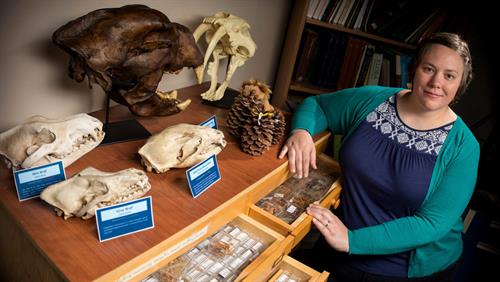Of Mice and Mammoths: Ice Age Perspectives on Climate Change, Extinction, and Resilience
Earth’s largest animals disappeared at the end of the last ice age, leaving consequences for biodiversity that are still playing out thousands of years later. But the story isn’t all bleak—there are tales of resilience and survival, too. These lessons from the past can help inform cutting edge—but often controversial—conservation strategies today, from managed relocation of species to de-extinction and rewilding. Understanding how yesterday’s biodiversity responded to “natural experiments” like climate change, extinction, and other threats can help ecologists prepare for the challenges of the coming century.
Jacquelyn Gill is an assistant professor of paleoecology at the Climate Change Institute and the School of Biology and Ecology at the University of Maine, where she directs the BEAST Lab for investigations on Biodiversity and Environments Across Space and Time. An ice age ecologist, she uses the natural experiments of the fossil record to understand challenges facing ecosystems in a warming world, with a particular focus on extinction impacts. She co-hosts “Warm Regards,” a podcast of climate change conversations. Her presentation is part of the Ted Exford Climate Stewards Lecture series, with support provided by Dave and Loretta (Exford) Hoglund.

Date and Time
Wednesday Aug 22, 2018
6:00 PM - 7:30 PM EDT
August 22, 6-7:30pm
Location
Wells Reserve at Laudholm
342 Laudholm Farm Rd
Wells, ME
Fees/Admission
$5 suggested donation.
Contact Information
207-646-1555
Send Email

